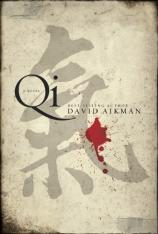Qi
Review
Qi
Qi. If you're a Scrabble player, then you've just found a new word to use with your "Q" tile that doesn't require the accompanying "U." That little nugget just might come in handy during your next late night round of the classic board game with friends. But even if you're more suited for Trivial Pursuit or Scattegories or oh-so-random conversations with friends, "qi" might be a term to keep in your back pocket.
The word "qi" is actually pronounced "chee" and is used to describe the inner energy or life force that accompanies a person as well as the universe as a whole. Qigong, a derivative of qi, is an ancient Chinese spiritual and mystical practice. This is the unusual title that David Aikman chose to kick off his new fiction series based on the adventures of Richard Ireton, an American journalist whose profession reflects Aikman's real life work.
In this slow-starting but eventually fast-moving book, Richard Ireton is the bureau chief in Hong Kong for a successful news magazine known as Epoch (which rings a bit too true to Aikman's work with Time). Ireton is suddenly sent to Guangzhou, a Chinese province near Hong Kong, to look for a missing American named Chuck McHale. During his investigation, he encounters a wave of anti-Americanism and talk of a coup that traces back to the Grand Master of Qigong. Corrupt military leaders, the mafia and an underground criminal group known as the Triad are involved. But if that weren't enough, Ireton must also navigate a rather bumpy start to the relationship with his new girlfriend, Trish, as well as brief encounters with a sharp but kind Christian missionary and a few individuals involved in the underground church.
About halfway through the book, the story picks up steam as Ireton is invited to a rather posh restaurant with the leaders of the planned coup. The details of scenes, including the colorful and repugnant food and characters, as well as the pace with which Aikman writes, are exceptional. At this point, QI comes alive.
Unfortunately, the last third of the book seems rushed, with quick, pat answers offered as substitutes for a satisfactory sense of closure. A six-page epilogue is used to tightly seal up any loose ends, giving the feel that the book's climax is out of place. In the end, Ireton is heading off to accept a position as the bureau chief in Jerusalem and providing an easy transition for the next installment in the "Richard Ireton" series.
That said, there are many reasons to read this book. Some of the weaknesses of the title may actually be set-ups for future books in the series. But even if they aren't, Aikman undoubtedly will become a better fiction writer with future projects. Also, he offers rich insights into Chinese history, culture and spirituality. And the book manages to subtly touch on Christian themes without being preachy. Aikman is a gifted and talented writer, and this is a series that will keep getting better and better.
Reviewed by Margaret Feinberg on October 1, 2005



